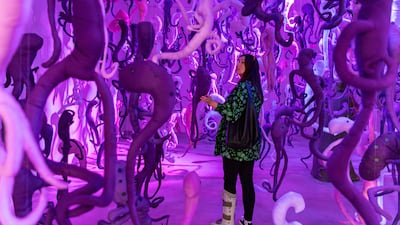Recently, the UAE has taken a big step to become a global hub for culture, arts and creativity. The enactment of a federal decree issued in October – and which is now in effect – underscores the UAE's commitment to cultural innovation and creativity.
The decree on empowering the arts sector lays out a detailed framework to cultivate artistic expression, enhance creative production and energise the creative economy. If implemented effectively, it has the potential to revolutionise the cultural sector and bolster its contributions to the nation's socio-economic growth.
From my perspective, this decree is not only timely but also an ambitious blueprint for cultural transformation by the UAE Cabinet and Ministry of Culture. It offers a comprehensive approach by focusing on five strategic pillars: building an enabling environment for the arts, encouraging artistic production, promoting cultural co-existence, stimulating the creative economy, and unifying regulatory frameworks. By licensing and regulating a wide spectrum of art-related activities, the decree seeks to empower institutions with financial and legal independence, thus fostering innovation while safeguarding artistic integrity.
The potential impact of this decree on the UAE’s cultural sector is immense. It paves the way for institutional growth by facilitating the establishment and licensing of art institutions with greater autonomy. This, in turn, could lead to a decentralised and diverse cultural landscape, characterised by thriving art centres, private museums and galleries across the country.
Additionally, the decree integrates the creative economy into the broader national economic strategy, reflecting the UAE’s vision of diversifying beyond oil dependency. Globally, creative industries are major contributors to GDP, as evidenced by the UK’s creative sector, which contributed over £116 billion ($156bn) in 2019. The UAE can leverage its rich heritage and strategic position to replicate similar success.
The emphasis on cultural co-existence is particularly striking, aligning with the UAE's long-standing commitment to fostering tolerance and dialogue. Through initiatives akin to Germany’s Goethe-Institut or France’s Alliance Francaise, the UAE could enhance its role as a leader in cultural diplomacy.
Moreover, the decree holds promise for empowering artists and creatives, providing them with resources and platforms to showcase their talent on both local and international platforms as we have seen successfully implemented over the past 15 years with the UAE’s national pavilion for both art and architecture in Venice, Italy.

Another aspect I find compelling is the decree’s focus on digital transformation in the arts. By integrating advanced technologies, such as virtual and augmented reality, the UAE can expand access to art collections and exhibitions, mirroring successful global initiatives like the Smithsonian Institution’s virtual tours and others available closer to home, such as the Sharjah Art Museum and the Barjeel Art Foundation’s Collection. These innovations could bridge geographic and physical barriers, making art more accessible to wider audiences.
However, the road to success is not without challenges. Adequate funding remains a critical issue. While the government’s support is commendable, fostering public-private partnerships and corporate sponsorships could significantly amplify resources and is still a large gap to be explored and filled.
Moreover, accessibility and inclusivity are equally essential. Therefore, ensuring that art institutions cater to diverse audiences and community needs, including marginalised communities, will require thoughtful initiatives including, free admission days, tailored programmes for disability groups and meaningful community outreach programmes.
Monitoring and evaluation mechanisms are indispensable for the decree’s success. Clear metrics to measure its impact will ensure transparency and continuous refinement. Measuring success in the cultural sector has often been a debate as not all standard metrics apply or are relevant in truly identifying impact. Therefore, having clear values, objectives and learning outcomes are vital.
Talent development is another crucial factor as is investing in education and training for artists, curators, and cultural managers for building the sector’s human capital. Various UAE universities in the past 10 years do offer degree programmes in relevant subjects such as art history, museum studies and heritage management. However, more majors are needed, including in curatorial studies and in the creative industries as a whole.
The UAE can gain valuable insights from international frameworks. For example, the National Endowment for the Arts in the US demonstrates the efficacy of grant-based systems in fostering artistic innovation. Similarly, Australia’s creative partnerships between governments, businesses, and cultural organisations highlight the importance of collaboration for sustainable growth.
In the UAE, the Sharjah Art Foundation stands out for its tremendous efforts over the years in establishing diverse grants to support cultural production in the Middle East, with a vital focus on uplifting artists from the Arab region and the Global South, while celebrating creativity on a global scale. Complementing these efforts, the Ministry of Culture has recently introduced the National Grant Programme for Culture and Creativity, further expanding opportunities for artists, alongside initiatives led by other institutions across the UAE.
Another example, Unesco’s Creative Cities Network, highlights the value of integrating culture into urban development – a model the UAE can emulate by positioning its various emirates and their distinct cultural identities as they grow.
For this decree to achieve its full potential, I believe the UAE should prioritise several key strategies. Public awareness campaigns can educate citizens about the importance of arts and culture, fostering more intentional and consistent grassroots support. Incentives for innovation, such as grants and tax exemptions and government subsidies could encourage creative experimentation. International collaborations with cultural institutions can facilitate knowledge exchange, while the integration of technologies such as AI can redefine how art is created, shared and preserved.
In my view, the law on empowering the arts sector is a visionary initiative. By fostering an environment that supports artistic expression, stimulates the creative economy and promotes cultural dialogue, this decree has the potential to redefine the UAE’s cultural landscape.
Its success depend on thoughtful planning, inclusive policies and sustained investment. By building on international best practices and leveraging its unique cultural assets, the UAE can harness the transformative power of the arts to secure its place on the global cultural stage.


